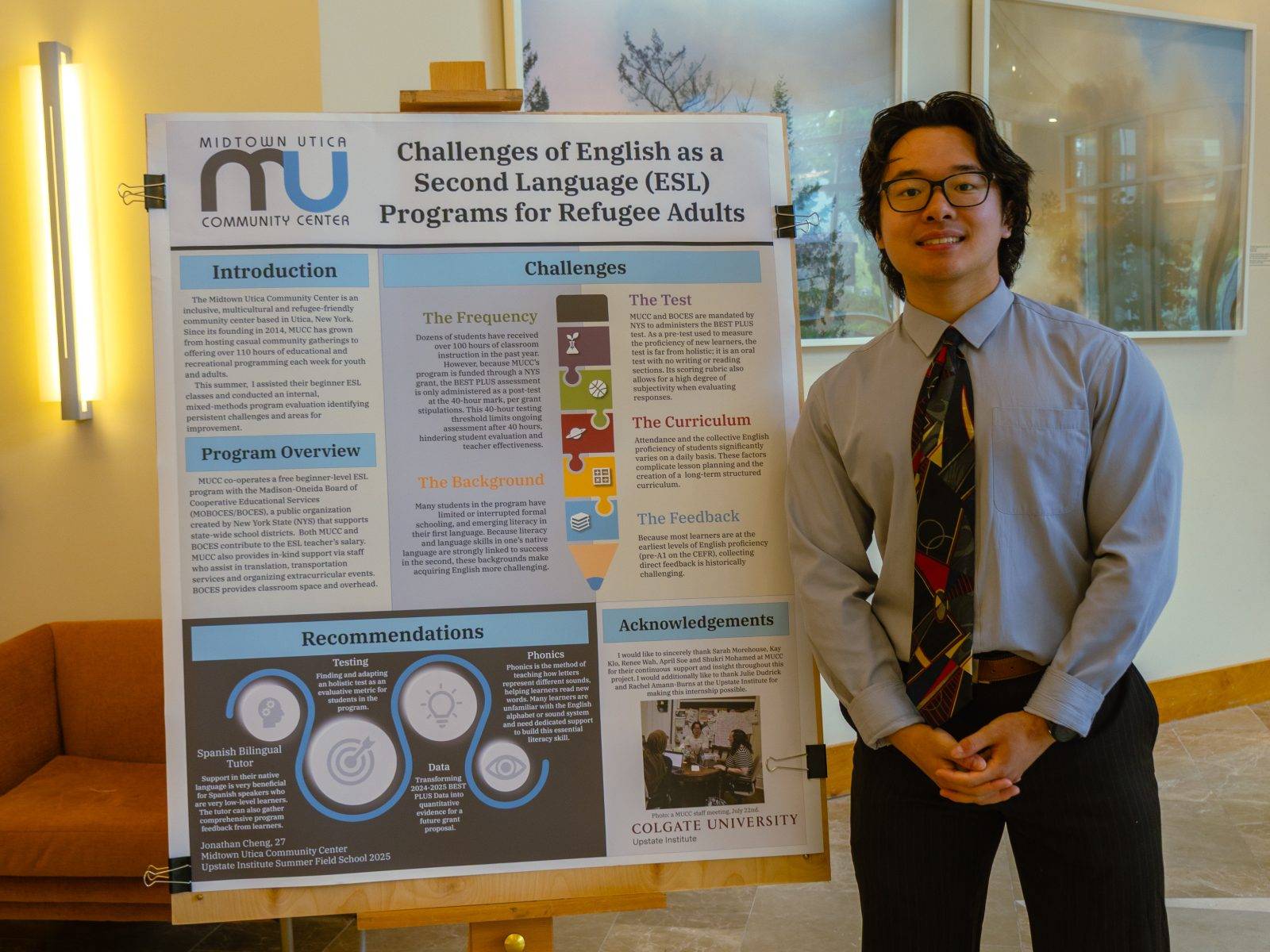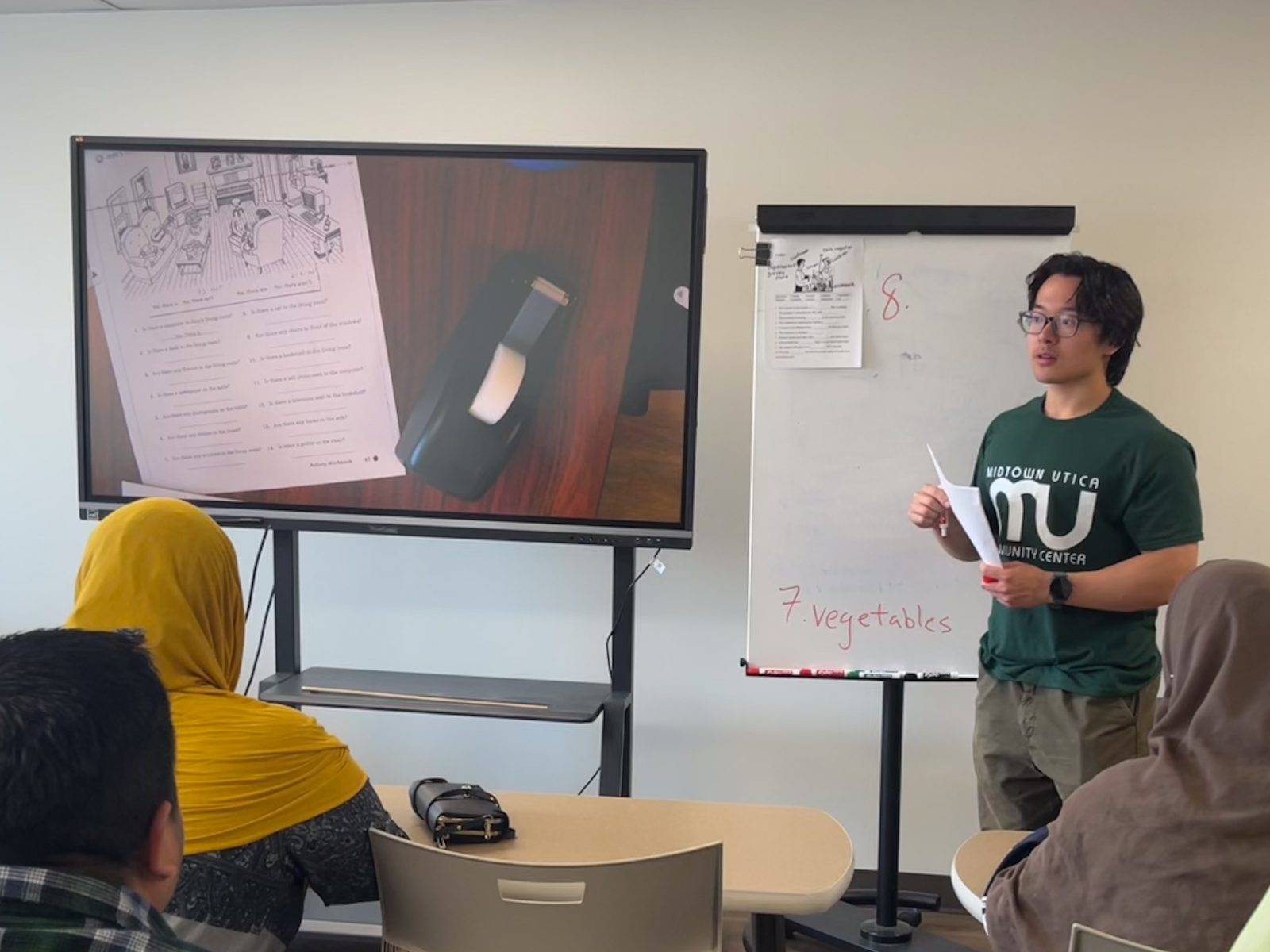This summer, I had the great opportunity to work with the Midtown Utica Community Center (MUCC) in Utica, N.Y. As an inclusive, multicultural, and refugee-friendly place, MUCC has grown from hosting casual community gatherings to offering more than 110 dedicated hours of educational and recreational programming each week for youth and adults.
My responsibilities primarily revolved around MUCC’s Beginner English as a Second Language (ESL) program for adults. The program is a partnership with the Madison-Oneida Board of Cooperative Services (MOBOCES/BOCES), a public organization created by New York State to support school districts throughout the state. Every Monday and Tuesday, I went to the BOCES Bleecker Street building to assist the daytime classes taught by Mary Hall (“Teacher Mary”), the beginner ESL teacher, in whatever capacity she deemed most helpful. My classroom role varied on a day-to-day basis, but on some occasions, I’d lead and teach the classroom for most of the class period. On other days, I’d work with small groups of students as they completed their assigned worksheets. The class primarily consisted of refugee adults. Beyond my responsibilities in the classroom, a major component of my internship was an internal evaluation of the ESL program. Using a mixed methods approach, I looked at quantitative program data, conducted interviews with MUCC and BOCES staff, drew on my own classroom experience, and incorporated relevant literature to identify persistent challenges and ideas for addressing those challenges given adequate funding and resources in the future.
In late February, the Upstate Institute extended me a Summer Field School Fellow offer and sent along MUCC’s project proposal. The initial proposal aimed to investigate literacy-based curriculum design and approaches for students in the program with a low formal background in literacy or education. The proposal’s leeway and flexibility initially challenged me; I had a topic, but I didn’t have a concrete research question. Nor did I have a good idea of the methods I’d use, or the concrete deliverables I’d hand in at the end of my 10-week internship. Just as importantly, my emerging understanding of the ESL program would surely change once I set foot in the classroom for the first time. This latter point stymied me heavily: how could I design and refine this research proposal when I still had multiple lingering questions about the ESL program’s structure and operation? More importantly, the outcomes of my project should help MUCC.
As a Japanese language major, Cantonese heritage speaker, and student who had just finished a fall semester course on second language acquisition, there were a few personal academic questions that I would have loved to investigate. However, the point of the Summer Field School Fellowship was not to pursue my own academic curiosities, but to address areas and gaps identified by the community partner. Recognizing this point solidified my mindset towards my project as a collaborative and iterative process. I wanted to create value for MUCC through trust in and out of the classroom, while allowing overall project clarity to emerge via osmosis from participation in MUCC-BOCES activities and ESL classes.
My internship officially started on July 1. On that day, Sarah gave me and two other MUCC interns a quick tour of the BOCES building. After sitting down in the staff break room with us, she began a mock ESL lesson in Thai. It took multiple rounds of explanation, a great deal of gesturing, and at least 15 minutes before I think I understood the Thai words for “him”, “her”, and “coffee.” Words that I promptly forgot by mid-afternoon. This eye-opening experience stuck with me throughout the duration of my internship with MUCC. Learning a new language, taught entirely in that language, with minimal background, is extremely challenging.
My experiences in the classroom gave me invaluable insight into the pedagogical and programmatic realities of refugee-centered adult ESL education. I came to understand each learner as an individual adult with a distinct set of experiences and goals, even if they currently could not fully express themselves or articulate these ideas in English yet. The students’ determination to learn, even in the face of multiple refugee or immigrant-related systemic barriers, highlighted their commitment to education. This awareness reminded me that I engage with students with significantly different educational trajectories from mine, and whose trajectories often do not include the luxuries I take for granted, studying another language at a liberal arts college.
I could not finish this blog post without mentioning my MUCCamp experience. MUCCamp is an annual week-long summer camp located in the Adirondacks for middle to high school students who come from immigrant or refugee backgrounds. During one of my May Zoom meetings with Sarah, I gave an enthusiastic verbal commitment and penciled out that week on my calendar. I was excited to spend nearly a week in the Adirondacks, help out with the occasional activity, and get work done in a beautiful setting. Fast forward to the Saturday drive up to camp. I sat in the back seat of the sedan, carpooling with two other staff members. I was engaged in their conversation, but most of it blurred past me like the landscape outside my window melting into a monotone ribbon. I felt calm. Disproportionately calm relative to the objective level of nervousness I should be feeling. This camp would be my first sleep-away summer camp, and challenges would surely follow. These feelings quickly proved correct. I led maintenance and custodial duties for the camp, photographed activities, and helped out with any staff responsibilities from event setup to kitchen work. I was truly challenged in many ways, whether it was developing a time-efficient cleaning workflow for the camp bathrooms, mentally keeping track of cleaning supplies in the sprawling, dimly lit maintenance shed, or maintaining a camp bonfire.
But none of these tasks challenged me as much as the Lost Camper Drill. My search zone was a two-story combined boathouse/chapel building and an outdoor canoe/kayak storage area. Both areas contained many hidden and poorly lit spots for children to hide, while every overturned canoe/kayak represented a potential hiding spot. The drill was staged twice, and both times I found the “missing camper” well within the time limit. However, I only found them on my second or third sweep, after retracing my steps and checking areas I’d sworn I previously checked. The experience truly instilled in me the urgency and thoroughness needed in real emergency situations; every second matters, and the safety of campers could hinge on my ability to search quickly and carefully. By the end of camp, my various camp roles led me to interact with and eventually reach a first-name basis with almost every staff member and camper.
Despite the sheer busyness of every camp day and ever-changing challenges, I went to bed with a great sense of satisfaction: I positively impacted the MUCCamp camper experience in several ways. I’m beyond thankful that I had the chance to help out and participate in a six-day-long summer camp, on top of a full-fledged summer internship.
I was initially drawn to this project because my language learning background at Colgate closely mirrored the MUCC proposal’s needs. Besides my new firsthand knowledge of ESL programs tailored specifically for refugee adults, I gained a better understanding of nonprofit operations in Utica and hope to continue working in the nonprofit space in future summers and potentially after graduation. — Jonathan Cheng ’27

